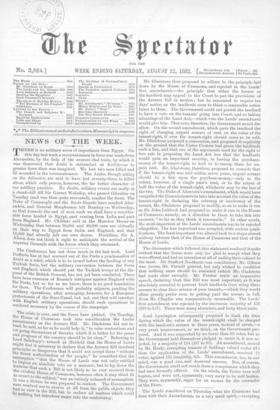Mr. Gladstone then proposed to adhere to the principle laid
down by the House of Commons, and rejected in the Lords' first amendment,—the principle that either the tenant or the landlord may appeal to the Court to put the provisions of the Arrears Bill in motion ; but he consented to require ten days' notice, as the landlords seem to think a reasonable notice fairer to them. The Government could not permit the landlord to have a veto on the tenants' going into Court, and so taking advantage of the Land Act.,—which veto the Lords' amendment would give him. That veto, therefore, the Government would dis- allow. On the second amendment, which gave the landlord the right of charging unpaid arrears of rent on the value of the tenant-right, if ever the tenant-right should come to be sold, Mr. Gladstone proposed a concession, and proposed it explicitly on the ground that the Ulster Custom had given the landlords such a lieu, and that one of the arguments used for the right of free sale in proposing the Land Act was that the landlords would gain an important security, in having the purchase- money of the tenant-right to look to to recoup them for un- paid rent. Mr. Gladstone, therefore, proposed to concede that if the tenant-right was sold within seven years, unpaid arrears should be a lien upon the purchase-money,—only to the extent, however, of a single year's rent, or to the extent of half the value of the tenant-right, whichever may be the less of the two. The Duke of Abercorn's amendment, which would have compelled the Commissioners to take into account the value of the tenant-right in declaring the solvency or insolvency of the tenant, Mr. Gladstone proposed to modify, so as to make it run as Sir John Lubbock had proposed to make it run in the House of Commons, namely, as a direction to them to take this into account, "so far as they think it reasonable." In other words, the most important of the Lords' amendments was to be rejected altogether. The less important was accepted, with serious quali- fications. The least important was altered back to a shape almost midway between that of the House of Commons and that of the House of Lords.






























